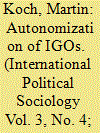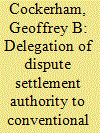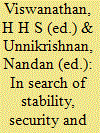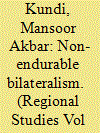| Srl | Item |
| 1 |
ID:
092300


|
|
|
|
|
| Publication |
2009.
|
| Summary/Abstract |
This article attempts to explain how international governmental organizations (IGOs) become autonomous. It argues for a conceptual shift to an organizational studies perspective that puts the concept of the organization at the center of attention. Although some approaches in IR already apply particular organizational theories, an open-system perspective offers a promising representation of IGOs, their internal dynamics, and external relations. Within an open-system perspective, modern system theory is useful for examining how autonomization processes can be explained by taking into account the momentum of self-referential closure on the basis of decisions.
|
|
|
|
|
|
|
|
|
|
|
|
|
|
|
|
| 2 |
ID:
082135


|
|
|
|
|
| Publication |
2008.
|
| Summary/Abstract |
The issue of dispute settlement is problematic in the international system because it may conflict with sovereignty. States may find, however, that in order to facilitate cooperation, they should delegate some authority to resolve disputes to a third party. This article seeks to provide a measure for dispute settlement authority and some explanation for the delegation aspect of international cooperation by examining why states agree to grant dispute settlement authority to a particular kind of institutional arrangement, conventional international governmental organizations (IGOs). The analysis reveals that states tend to enter into IGO agreements with a higher degree of dispute settlement authority when members have a greater incentive to defect due either to the large number of other parties to the agreement, or due to greater cooperative demands as provided by the agreement
|
|
|
|
|
|
|
|
|
|
|
|
|
|
|
|
| 3 |
ID:
075225


|
|
|
|
|
| Publication |
2006.
|
| Summary/Abstract |
The Kantian peace research program has produced generally robust results on the role of democracy and international trade in reducing the risk of international conflict. Yet a key theoretical linkage in the Kantian argument, that of international governmental organizations (IGOs) to peace, has proved less robust and more problematic. We propose a new theoretical perspective focusing on the contributions of a particular kind of IGO-that composed largely of democracies-to peaceful conflict resolution through aiding credible commitments, dispute settlement, and socialization to peaceful behavior. A set of statistical tests provides strong support for our hypotheses that such densely democratic IGOs are far more likely to engender peaceful relations between members than are more homogenous IGOs. This is true when controlling for regime type, interdependence, and several realist-oriented influences. The peace-inducing influences affect both democratic and nondemocratic member states.
|
|
|
|
|
|
|
|
|
|
|
|
|
|
|
|
| 4 |
ID:
120588


|
|
|
|
|
| Publication |
India, Observer Research Foundation, 2012.
|
| Description |
210p.Hbk
|
| Standard Number |
9788186818039
|
|
|
|
|
|
|
|
|
|
|
|
Copies: C:1/I:0,R:0,Q:0
Circulation
| Accession# | Call# | Current Location | Status | Policy | Location |
| 057328 | 327.06/VIS 057328 | Main | On Shelf | General | |
|
|
|
|
| 5 |
ID:
091803


|
|
|
|
|
| Publication |
2009.
|
| Summary/Abstract |
The international system broadly comprises the interaction of five types of actors: nation-states; international governmental organization (IGOs); non-governmental organizations (NGOs); movements such as national liberation movements (NLMs), and multi-national corporations (MNCs).
|
|
|
|
|
|
|
|
|
|
|
|
|
|
|
|